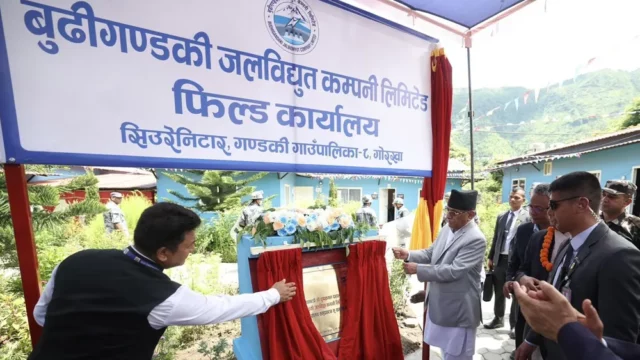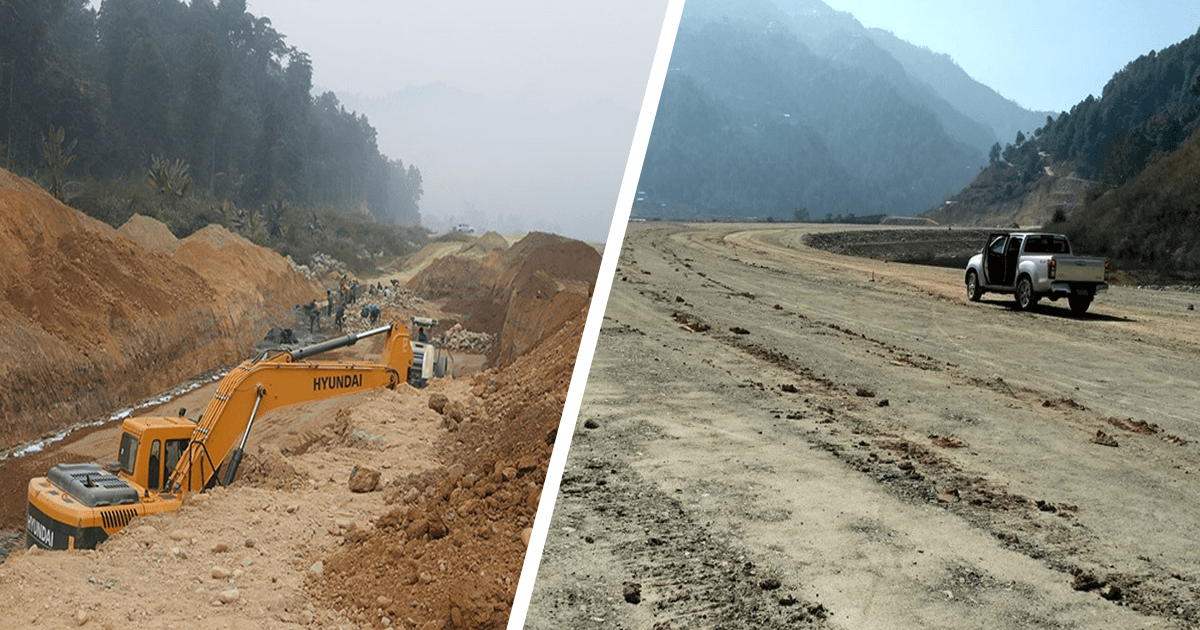KATHMANDU: In a renewed focus on the country’s ‘projects of national pride,’ Rabi Lamichhane-led Rastriya Swatantra Party (RSP) initiated a ‘Public Auditing’ to scrutinize the performance of these projects.
As a result, the discourse surrounding ‘National Pride’ has regained prominence.
Recently, RSP leaders undertook a journey along the Narayan-Butwal road section, emphasizing the urgency for the government’s attention.
Let’s delve into the current status of the nation’s top-priority projects:
In the pursuit of fostering a prosperous Nepal, the government has designated several projects as national pride projects.
These projects, considered top priorities, are empowered with all necessary resources to operate unhindered.
In the fiscal year 068/69 BS, as many as 17 projects were initially identified as ‘national pride projects’ to propel infrastructure development.
Currently, the list has expanded to include 24 projects.
Among these, the 456 MW Upper Tamakosi Hydropower Project, Gautam Buddha International Airport, and Pokhara International Airport have been completed and operational.
However, operational challenges persist, hindering Gautam Buddha and Pokhara International Airports from reaching full capacity and causing financial setbacks for the government.
The Melamchi Water Project, also designated as national pride, faced delays despite its inauguration on July 5, 2020.
While water reached Kathmandu temporarily, the project remains incomplete, leaving uncertainty about its completion timeline.
The modality for the remaining three projects – West Seti Hydropower Project (750 MW), Budhigandaki Hydropower Project (1,200 MW), and Nijgarh International Airport – remains unresolved.
Construction has yet to commence, leading to questions about the government’s commitment to these initiatives.
Budhigandaki Company Limited, entangled in compensation issues, faces construction uncertainties.

The Paschim Seti project, in a 33-year study and contract phase, has yet to progress to construction.
With two international airports not fully operational, concerns regarding the justification of Nijgadh airport persist.
Many ongoing national pride projects experience sluggish progress, with project heads citing insufficient budget prioritization as a major hurdle.
In contrast, officials from the National Planning Commission (NPC) assert that all projects are progressing smoothly.
Amidst these perspectives, it becomes imperative to conduct a comprehensive review of the current state of the national pride projects.
Sikta Irrigation Project:
This initiative strives to enhance agricultural productivity by providing irrigation facilities to a total of 42,766 hectares of arable land in the Rapti region.
The primary objective is to extend irrigation coverage to six local levels by constructing a 317 m barrage on the Rapti River in Agaiya of Rapti Sonari Rural Municipality in Banke.
Commencing in the fiscal year 2062/063 BS with an initial completion target of 2070/071 BS, the Sikta Irrigation Project faced challenges leading to an extension of the deadline and an increase in project costs.
Despite the second extension, the physical progress fell short of expectations, resulting in an additional two deadline extensions.
The project’s estimated cost has escalated to Rs 52.64 billion, compared to the initial projection of Rs 12.8 billion for this multi-year operation.
The NPC recently stated that both the financial and physical progress of the project is deemed satisfactory.
Babai Irrigation Project:
Initiated in 2045 BS, the Babai Irrigation Project aims to provide irrigation to 40,000 hectares of land in the Bardiya district.
By 2058 BS, a stretch of 22.5 km had been completed. Post-construction, ongoing efforts focus on expanding irrigation coverage to new areas.
However, the project faced setbacks in 2071 BS due to floods, prompting ongoing efforts to conclude the work by 2083 at a revised cost exceeding Rs 18.96 billion.
The project itself acknowledges concerns about meeting the stipulated timeline at the current pace of progress.
Rani Jamra Kulariya Irrigation Project:
The construction of the Rani Jamra Kulariya irrigation project, a national pride initiative, began 14 years ago.
Launched in 2066 BS, the project was initially scheduled for completion in the fiscal year 2073/74 BS.
However, progress during this period did not align with the targeted milestones.
The project’s expansion, involving the inclusion of sections from the Kandra and Pathraiya rivers, is anticipated to extend the completion timeline by another 8 years if the current pace of work continues.
The project’s primary objective is to provide irrigation facilities for 38 thousand hectares of land.
Bheri-Babai Diversion Project:
The completion of the Bheri-Babai Diversion Project, another national pride endeavor, is expected to require an additional three years.
Despite being halfway through overall physical progress, the project aims to transfer 40 cubic meters of water per second from the Bheri River to the Babai River by the fiscal year 2079/80 BS.
Additionally, the project aims to generate 46.8 megawatts of electricity and provide year-round irrigation for approximately 51 thousand hectares of land in Bardia and Banke districts.
Unfortunately, the project is not anticipated to conclude in the upcoming fiscal year.
Upper Tamakoshi Project:
With a total capacity of 456 MW, the construction work of the Upper Tamakoshi Project has been successfully completed, and it is now operational, contributing electricity to the National Broadcasting Grid.
Budhi Gandaki Hydroelectric Project:
In the decade since the initiation of the 1200 MW Budhigandaki hydropower project, only 10 percent of physical progress has been achieved.
After eight years of uncertainty regarding project ownership, it was completed in 7 years and 10 months and advanced in the fiscal year 2069/70 BS.
The government’s decision in 2078 BS to construct the project with domestic investment and establish it as a company led to the registration of Budhigandaki Jalvidyut Public Company Limited in 2079 BS.
The project has incurred a cost of 42.70 billion rupees, with compensation nearing its final stages.
Until the financial year 2079/80 BS, compensation totaling 34 billion 30 million rupees has been distributed for 49,095 ropani of land in Gorkha and Dhading.
Notably, the construction for the Budhigandaki project, designated as a national pride initiative, is yet to commence despite the compensation efforts.
West Seti Hydroelectric Project:
The West Seti Hydroelectric Project envisions generating 750 megawatts of electricity by relocating over 2,000 families from Baitadi, Doti, Bajhang, and Dadeldhura.
Initially initiated in 1980/81, a study by the French company Sogrech Consultants preceded a bilateral project agreement between the Ministry of Water Resources and the Australian company Smek in 1990.
The project agreement, inked in 1997, faced financial challenges leading to contract termination in 2011.
Subsequently, an agreement with the Chinese company CTGI was signed in 2012, but it too withdrew citing financial constraints.
Presently, the Indian company NHPC Limited is conducting a study for the Paschim Seti hydroelectric project, with the government expressing confidence in its completion after 33 years of studies and contracts.
Madhyapahari (Pushpalal) Lokmarga:
The construction of the Pushpalal Madhyapahari (midhill) Lokmarga, initiated in 2065 BS with an original completion target of 8 years, remains incomplete 15 years later.
Designated as a national pride project in the financial year 2069/70, the project has faced delays due to the government’s insufficient attention to resolving construction-related issues.
The revised cost estimate for this project, initially projected at 33 billion, has escalated to Rs 84.33 billion.
The Pushpalal Lokmarg, spanning 1,878 km from Chiwabhanjang in East Panchthar to Jhulaghat in West Baitadi, asserts a physical progress of approximately 75 percent, with financial progress reaching 77 percent according to the project’s claims.
Hulaki Marga:
Hulaki Marga, a national pride project under construction, has been in progress for 19 years.
Despite being slated for completion this year, more than half of the project remains unfinished, as reported by the project.
Kathmandu-Tarai Expressway:
The Kathmandu-Tarai Expressway, Nepal’s inaugural expressway covering a distance of 72.5 km connecting Kathmandu with Terai-Madhes, initially faced slow construction.
However, the pace has accelerated. The Nepali Army, however, has indicated that the project may not meet the specified deadline in the fiscal year 080/81 BS.
Karnali Corridor:
The Karnali Corridor, connecting Humla district to the national road network, has achieved track opening completion.
This ambitious project aims to establish a total of 269 km of roads.
East-West Railway:
Despite notifications for land acquisition for the Kakarvitta-Inaruwa section, the government faces challenges in securing the land.
The detailed project report for the Nijgadh-Amaraparuri section is in progress, with gradual construction advancement planned for the remaining sections.
Koshi Corridor:
Initiated to open and upgrade the track from Khandbari to Kimathanka, connecting India from Jogbani to China, the Koshi Corridor project reports satisfactory construction progress.
Separate contracts have been awarded for the corridor’s completion.
Kaligandaki Corridor:
The Kaligandaki Corridor, spanning 186 km from Gandakot in Nawalparasi to Jomsom in Mustang, connecting the northern border to Korala, has opened all tracks.
The project reports that bridge construction and road section asphalting are in the final stages.
Nijgadh International Airport:
Nijgadh International Airport, a project of national pride in the spotlight for 29 years, has faced controversy and discussions since 2070 BS.
Despite a projected cost of Rs 120 billion and an aim to complete construction by 2079 BS, the project has seen no progress.
The Parliament’s National Concerns and Coordination Committee raised concerns, citing the absence of a ready Detailed Project Report (DPR).
Conservationists have raised concerns, criticizing the government for the potential serious environmental damage posed by a project in Bara district.
The project entails clearing a substantial forest area, eliciting opposition from environmental advocates.
Despite government support for the project’s advancement, it remains incomplete.
President’s Chure Conservation Program:
Initiated with the objective of reviewing guidelines and procedures related to the chure region, fostering group networking among upper coastal residents, and establishing a new permanent nursery, the President Chure Conservation Program faces challenges.
Insufficient budget allocation is hindering the effective implementation of the program.
Lumbini Area Development Fund:
Designated as a project of national pride by the government, the development of the Lumbini region has encountered obstacles due to budgetary constraints.
Although a master plan has been prepared for the area, the lack of adequate funding has impeded the acceleration of development efforts.
Pashupati Area Development Fund:
The draft of the Greater Pashupati Area Development Master Plan has been formulated and is currently under discussion and coordination for finalization.
Concurrently, the critical task of fortifying the main structure of the Pashupati temple has reached its concluding stages, marking significant progress in this development initiative.









Comment